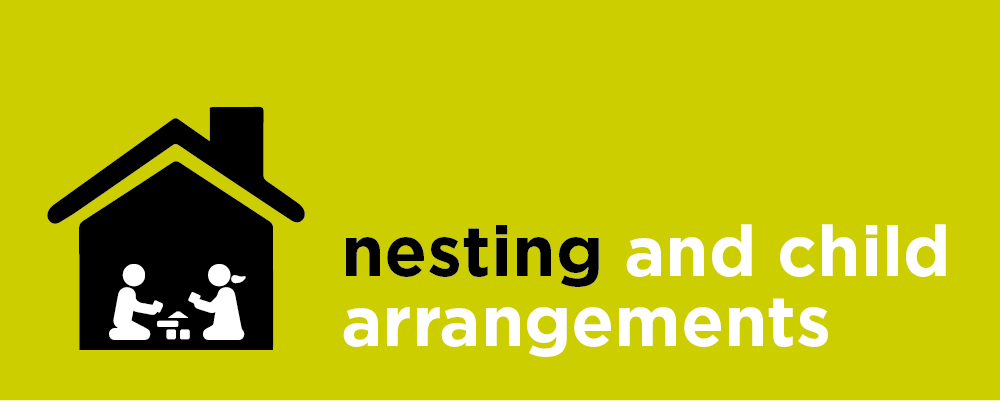- Basildon 01268244144
- Chelmsford 01245453800
- Colchester 01206217300
- London 020 4586 1280

The term “Nesting Arrangement” refers to an arrangement whereby the children remain in one property (generally the family home) and the parents take turns living in the property and looking after the children.
A recent case
In a recent case of A,B and C (Children: Nesting Arrangements) [2022] EWCA Civ 68, the three children aged 9, 15 and 17, lived with both parents on a 2:2:5:5 basis. This required the parents to take turns in vacating the family home each 2 or 5 days every fortnight. Whilst this had been initially agreed between the parents, the judge dealing with the financial remedy application, on hearing about the arrangement, expressed some concern as to its suitability.
Some six months later, the mother made an application to the court for a child arrangements order. She sought to change the arrangements so that the parents would share the care of the children but between two households. The father wished the Nesting Arrangements to continue. The children’s wishes and feelings were explored and they each indicated a desire to remain living in the family home.
An Independent Social Worker was instructed and reported that the Nesting Arrangement was not in the children’s best interests because of the level of ongoing disagreement between the parents. The expert was concerned that the continuing arrangements would impact the children’s relationship with their mother and that the fathers conduct was characterised by coercive and controlling behaviour.
The final hearing was adjourned by consent, but one day of the hearing was used to consider what arrangements for the children should continue in the interim. The judge heard submissions and determined that the arrangements should be varied so that the children would spend alternate weeks with each parent and the children spending increasing amounts of time with their mother at her own property.
The father appealed on three grounds;
- The interim hearing was unfair: as it proceeds only on the Independent Social Workers Report and without statements or cross examination. This was not accepted by the Court of Appeal as interim hearings are often carried out on the basis of submissions only and the father could have applied to cross examine the expert or to file a statement but had not done so.
- That the judge was not impartial. This relied on the fact that it had been the same judge who expressed reservations in the financial remedy proceedings as had made the order being appealed. This was also not accepted by the Court of Appeal. The father had not applied for the Judge to be recused or raised concern at all before the hearing.
- That it was wrong to change the arrangements at an interim stage given the children’s contrary wishes and feelings. This also was not accepted by the court who considered that the decision was one which was objective and child focused and which the judge was entitled to reach taking into account a balanced view of the welfare checklist.
It was also not an order which pre-determined the final outcome as the court retained the ability to make such other orders on final hearing including revision to a Nesting Arrangement if that is what was considered to be in the children’s best interests.
Arrangements for children post separation
When considering the arrangements for children post separation, parents are obliged to promote such arrangements to allow the children to enjoy a relationship with both parents so long as it is safe. No two families are the same and for some, a Nesting Arrangement may be the best option on an initial or longer term basis.
A Nesting Arrangement has a number of advantages
- It allows the children to have a stable base usually in the property they have known as their home and which is close to their schools and friends.
- It allows the children to enjoy a relationship with both parents who can equally deal with day to day parenting i.e school, homework, clubs as well as fun time when they are with the children.
- Everything that the children want/need is located in one property. This might include favourite toys, games consoles, clothes and even family pets.
However, it also comes with a number of disadvantages including:
- Both parents will have to have alternate accommodation available to them for the periods when they vacate the house. That is likely to come at a financial cost. Rather than two properties, do you have three? Or do you rely on friends and family to give you somewhere to stay on a regular basis?
- How do you manage the cost associated with the property such as the utilities or food and upkeep?
- Such an arrangement will likely result in both parents remaining financially tied to each other which can bring with it many other problems.
- Any arrangement which requires a person to pack up and move accommodation on a regular basis is likely to be disruptive. Both parents may come to feel that the family home is not their “home”, a place where they can relax or move forward with their lives.
- It requires a very high degree of parental cooperation and communication. Where there is animosity or elements of domestic abuse and control, the arrangements are open to manipulation or abuse.
- It effectively cocoons the children from engaging fully in their parents' lives moving forwards. Everything centres around the property when in reality family relationships are based on so much more than bricks and mortar.
If you are considering separation or have separated from your partner and are considering what arrangements to put in place for the children, I can be contacted via Karen.Johnson@birkettlong.co.uk for an initial free, no obligation chat on 01206 217305 or alternatively, complete our online enquiry form and one of our specialist family solicitors will contact you.



Comments